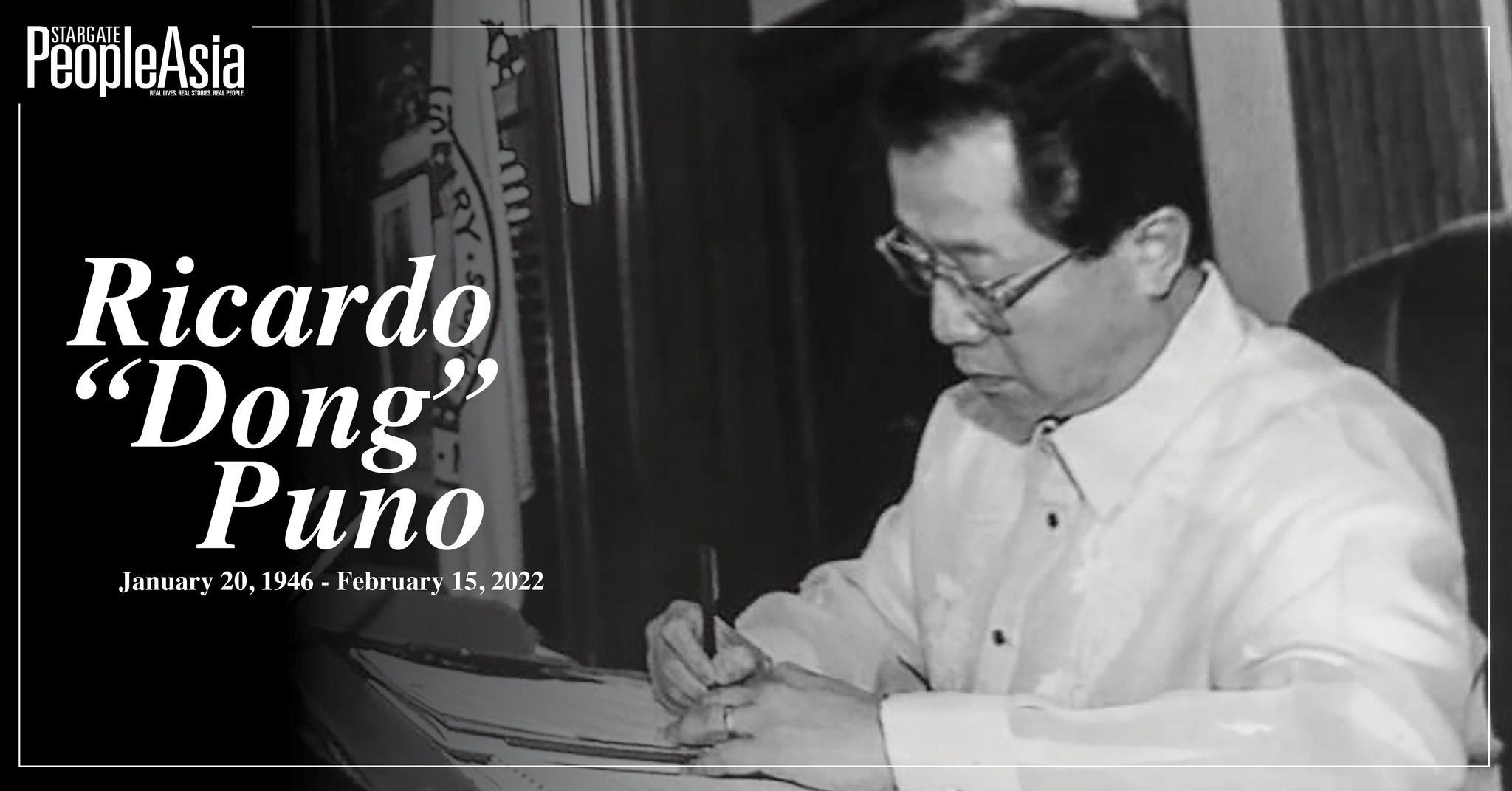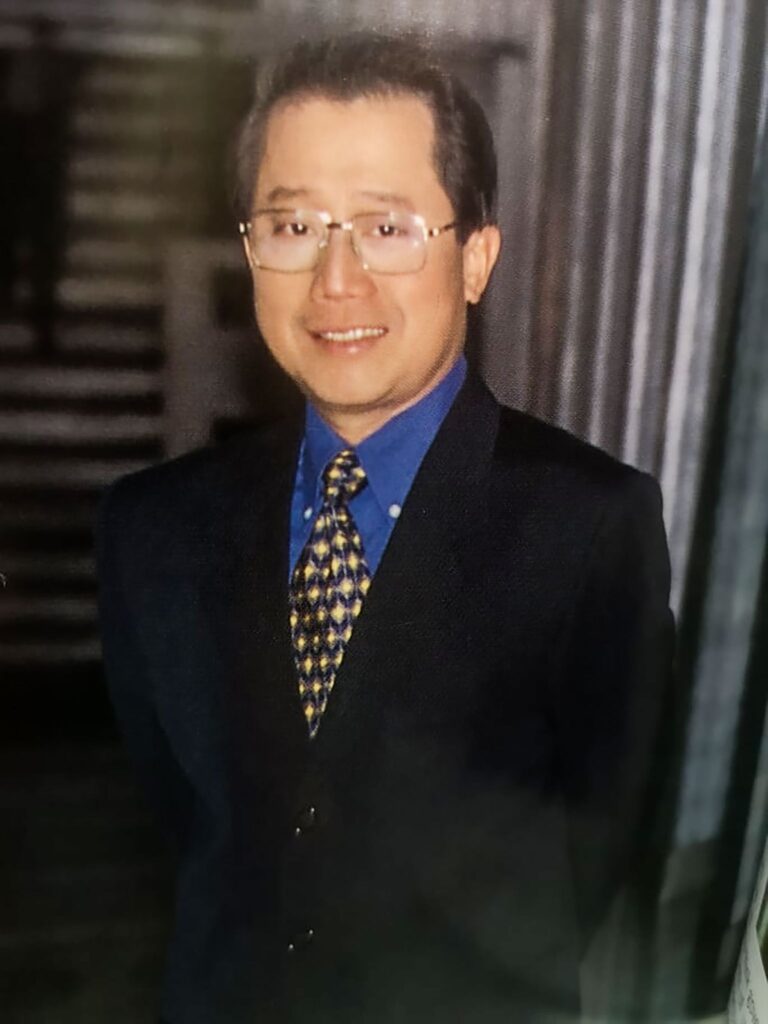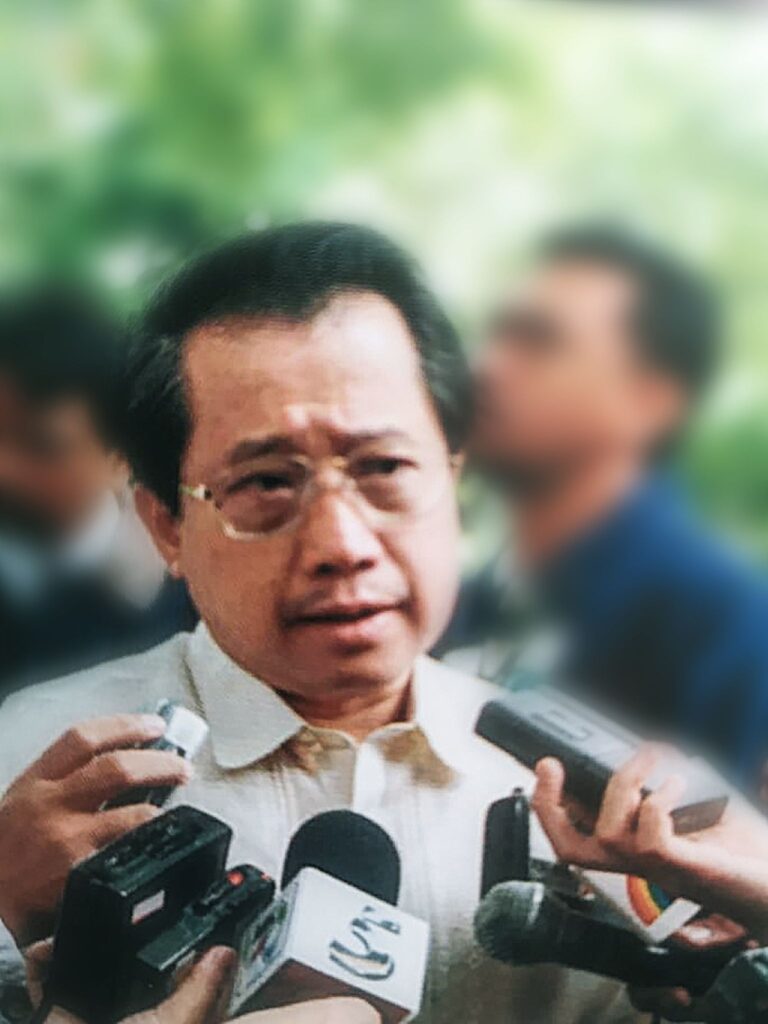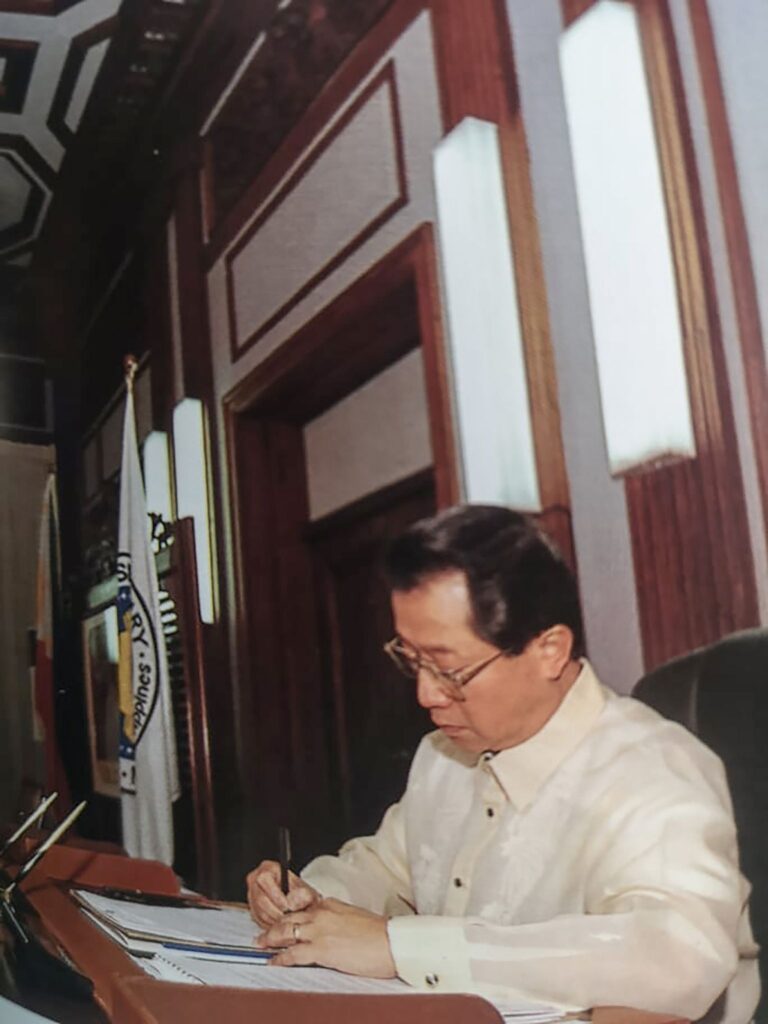PeopleAsia editor-in-chief JOANNE RAE RAMIREZ writes about then Press Secretary Ricardo “Dong” Puno Jr. in the magazine’s September 2000 issue.
When Ricardo “Dong” Puno Jr. was first invited to the White House in 1989, he was part of the press pool covering the state visit of then President Corazon Aquino. He and the other members of the pool passed through the back door and were entertained by the Marines.
Last July, Puno returned to the White House in a motorcade and walked the red carpet to the front door. As press secretary to President Joseph Estrada, the former broadcast pool reporter and TV host also had a special seat reserved for him at a lunch tendered by US President Bill Clinton at the White House’s Private Dining Room.
The view from there is a whole lot different from that in the press room, but that is exactly what Puno, a broadcast executive and newspaper columnist before he became press secretary, likes about his new job. It gives him a different viewpoint.
“As a columnist and broadcast practitioner, you are always used to looking at things from the outside. I’m very comfortable asking questions, follow-ups, pursuing this and that on a possible anomaly, irregularity. But looking at it from the inside gives you an entirely different perspective,” points out Puno, a practising lawyer before he became a top TV host. “My job now gives me the ability to be there ‘at the creation’,” he smiles, revealing a set of straight pearly white teeth, “You were present at the creation in the sense that when there are policy discussions you are there. You see the people that become responsible for them.”
Being present “at the creation” has made Puno more understanding of some of the personalities and processes he once made mince-meat of.
“What this does tell me is that the fault, dear Brutus, is not only in what you think government officials do but in both of us. The media sometimes take shortcuts in their analysis of a situation. Sometimes they do not have complete facts. Worse, they pretend to make an analysis when the facts aren’t there. That is the perspective. That is why I thought this might be an interesting thing to do,” says this father of two.
A handsomely-paid network executive before he became Mr. Estrada’s press secretary and spokesman, Puno also concedes that he accepted his twin posts because the moment had come for him “to do time” in public service.
We are at his cavernous office at Malacañang’s Kalayaan Hall, whose ornate ceilings and cornices are mute testimony to many a historical episode in the life of this nation. A most elegant place to “do time” in public service, but Puno’s responsibilities leave him little time to admire the woodwork.
“This may seem overly romantic or idealistic, but I cannot put it any other way. It is really just the call of public service. I do agree with (former presidential spokesperson) Jerry Barican that at some point in your career, you probably have ‘to do your time’ in public service,” he points out.
Results are what President Estrada got from Puno just months after the popular TV personality warmed his seat.
And the results were much appreciated, especially because they were validated by numbers. A telephone survey commissioned by the Palace saw the popularity of the President, then beleaguered by an embarrassing hostage crisis, spiraling gas prices and bad press, shoot up by more than 30 points.
Puno had masterfully shielded the President from the press when he was most vulnerable and more prone to mistakes, and it worked. For one, he cut down the number of radio interviews the President gave. The interviews, usually scheduled in the mornings captured the president, who is a night person, when he was not at his most vibrant.
“Sabak kaagad (I had to work right away),” Puno, who had to resign as senior vice president for news and current affairs of ABS-CBN, recalls.
He not only gave up a much higher pay, but also whatever little free time he enjoyed, including mornings at the gym.
“Your sleeping patterns are totally out of whack. It is a very long day and you have to get used to about four to five hours sleep. But,” he consoles himself, “some days are better than the others. The problems don’t overwhelm me because I’ve seen them before.”
The telegenic lawyer was invited by Mr. Estrada to be his press secretary over red wine (Chateau Margaux 1997) in a closed-door meeting at the Palace.
“We were with a group, and then the President asked the rest of the officials present to leave the two of us alone. Then he poured red wine into my glass and his, to exactly the same level,” Puno recalls.
And Puno, a wine connoisseur and the eldest son of a former public official, was wooed. Not just by the wine, but also by the call to public service.
The Jesuits at his alma mater Ateneo de Manila (he graduated cum laude from college) had tried to woo him for the priesthood, and Puno himself had once hoped to be a teacher. Although his father Ricardo Sr. was a municipal judge for many years and later a justice minister, Dong did not aspire for a government post. Instead he became a lawyer (after Ateneo, he mastered in law at Harvard) and a TV personality.
And when a government post was offered to him at the time of his life when his nationalism was ripe for the picking, it had to be a job many observers call “impossible.”
Puno disagrees.
“It’s difficult, that’s to be sure. In many ways it’s a thankless job, one that requires you to be different persons at the same time. But I don’t think it’s impossible,” he stresses.
It helped that he had plenty of experience in management. At ABS-CBN, he run a department that had its own Milky Way of stars and a P1.4 billion revenue budget. At the Office of the Press Secretary, Puno has a budget of P800 million and some 3,000 personnel but only one star: the President.
What law school and his stint at management did not teach him was how to deal with the Malacañang Press Corps. But after riding out the initial adjustment problems, Puno seems to be getting along with them, too.
“What is important is a certain amount of system. A system that is not so inflexible as to not to admit the personal side of it. There are a lot of elements of this job which require a lot of personal contact. Adjusting to different styles of people, maybe that is what is difficult. You just cannot lay down rules, and think that is what everybody is going to do,” he says.
Unlike his predecessor Rodolfo Reyes, Puno is also the president’s spokesman, which means he not only has to run a government department, he also has to be the President’s alter ego.
His managerial skills have been tested, that is true. But being spokesperson is an entirely new ballgame for Puno.
“I have to be really assured, and I have to assure myself, that I am in tune with what the President is thinking. There is no way you can go to him every single day and clear stuff with him. The schedule doesn’t allow that. There will be times on very important matters that you ought to do that. But the rest of the time, it is instinctive. You have to be able to assure yourself that this is probably what the President will be saying.”
But so far, Puno has never had the humiliation of being denied by his own boss.
“My batting average has been pretty good and the President and I have not had any open disagreement. Luckily, I have not said anything that is contrary to what the President has said,” Puno says.
Still, the sailing has not been all that smooth for the multi-awarded TV talk show host.
The powerful Commission on Appointments last summer deferred his appointment and the loudest objection to his confirmation came from a congressman he once wrote critically about.
Puno is unfazed. “I don’t regret being punished for doing what I think is right,” he says.
He adds: “Besides, I have a safety net. I always have the option to walk and go back to where I was before.”
The other option is for him to run for a Senate seat. Puno has probably given the idea some thought, just like he gave the idea of being press secretary some thought even before it was formally offered to him.
But for now, he’s not saying.
“After this job, I probably will not go back quite to where I was before. Maybe I want to smell the flowers a little bit. Tone down the pace a little bit. I’m 54. Maybe it’s time I enjoyed what I’ve worked for all these years.”








